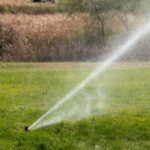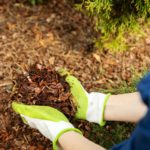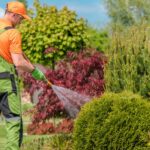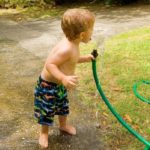Fertilizing is one of the most important things you can do to maintain a healthy lawn and garden. And it’s probably also one of the riskiest — slight missteps can quickly result in brown patches, yellowing leaves, and stunted growth. So, as you plan and prep your fertilizing strategy, an important question might emerge: Should you water before or after applying fertilizer?
You should water your yard both before and after fertilizing. That’s because watering before helps the ground absorb the fertilizer better, and watering after activates and dissolves the fertilizer so it can reach the roots of your plants. It also rinses away fertilizer sitting on the foliage.
Lawn fertilizers include one or more of three primary nutrients: nitrogen, phosphorus, and potassium. Some are also combined with herbicides or other products. So, generally, they’re complex concoctions that need proper handling; otherwise, you’ll end up with more problems than you started with. Let’s find out more about watering your yard after fertilizing and a few tips to get it right.
Should You Water Your Yard Before or After Fertilizing?
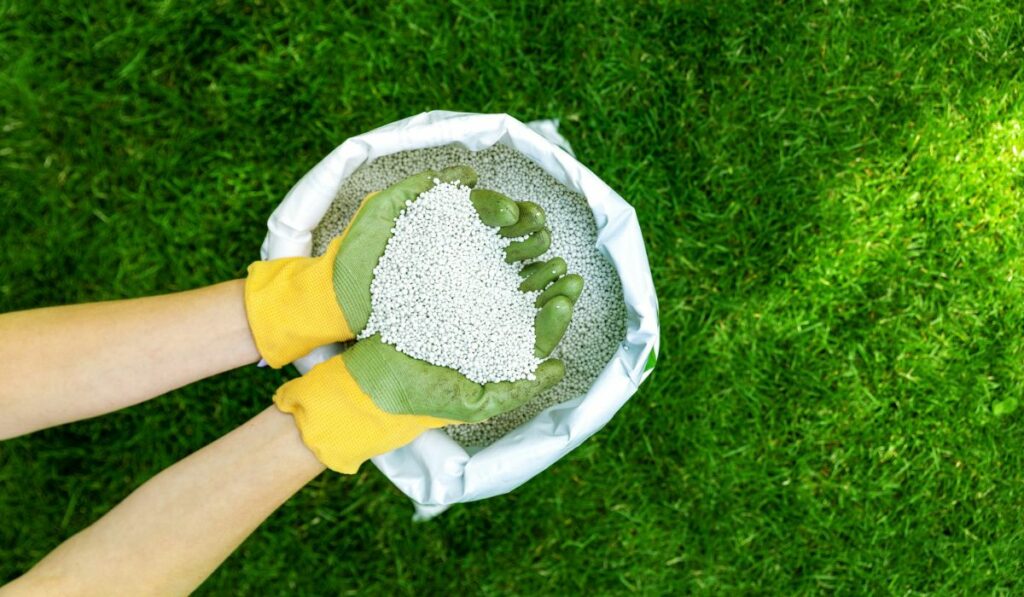
The quick answer is that you should water your yard before and after applying fertilizer. But there’s a little more to it than that. When you fertilize your lawn, you’re essentially sprinkling a bunch of concentrated nutrients onto the grass.
If there’s no water to help those nutrients sink into the roots, they’ll just sit on top of the soil in contact with the blades of grass and eventually burn them. So you have to water, but you don’t want to water too much. Just give the lawn a good soaking so the fertilizer can do its job.
But if your lawn is bone dry, the water you give after applying fertilizer will just run off the surface, taking the fertilizer with it. In that case, you should do a deep watering the day before you fertilize, then apply the fertilizer when the soil is damp, and do another deep watering immediately after. This will help the water and fertilizer soak in better and give your lawn a much-needed boost.
Then the question arises: When is the right time to water the yard after fertilizing? The answer lies in the type of fertilizer you’re using. If it’s a granular fertilizer like this one from Flagship (on Amazon), you should water it right away because granules need water to dissolve.
If it’s a liquid fertilizer like Maximum Green & Growth’s Lawn Food (on Amazon), you can wait a few hours. Other types of fertilizer, such as organic or slow-release, can take a few days to break down, so you can wait a bit longer to water. But generally, water within 24 hours of applying fertilizer to your lawn.
You can also plan the timing of your fertilizer application around rainfall. Rain provides even water distribution and can be a great way to get the fertilizer deep into the roots. Just make sure the forecast is for less than an inch of rain. Remember, the key is to water just enough to help the fertilizer get soaked in, but not so much that it runs off.
Keep in mind that the best time of day to fertilize your lawn is early morning before the sun gets too hot. This gives the grass a chance to absorb the nutrients before they evaporate.
What to Do After Watering?
After the first watering, don’t apply any more water for the next couple of days. This gives the fertilizer time to work into the roots and start doing its job. You can then go back to your regular watering schedule.
For the next few weeks, keep an eye on your lawn to see how it’s responding to the fertilizer. If you see any brown or yellow patches or the grass isn’t growing as quickly as you’d like, give it another light watering and wait a few more days.
Whenever you water, give your lawn deep soakings rather than frequent, light watering. This encourages deeper root growth, which is better for the long-term health of your lawn.
What About Liquid Fertilizers?
Liquid fertilizers are fast-acting fertilizers that are diluted with water and applied directly to the lawn through a hose-end sprayer or a lawn sprinkler system. Since they’re already liquid, there isn’t much need to water after applying them. And they’re also safer, so there’s less risk of leave burnout.
However, the best practice is still to water your lawn before applying liquid fertilizer. This will help the fertilizer spread more evenly and sink in better. And then, lightly sprinkle water after applying it so that it doesn’t just sit on the surface.
For further guidance, carefully read the instructions on the label of whatever liquid fertilizer you use.
How Long Can You Wait to Water Your Yard After Fertilizing?
It’s always best to water your lawn as soon as possible after applying fertilizer. This gives the fertilizer a chance to sink in and start working. Furthermore, the sooner you water, the less chance there is of fertilizer burn.
Fertilizer burn happens when the fertilizer doesn’t have enough water to dilute it, and it sits on the blades of grass. This can cause the grass to turn brown or yellow and even die. But if you can’t water right away, don’t worry. Just make sure you do it within 24 hours.
All that said, the concentration and type of fertilizer you’re using will also affect how long you can wait to water. As we mentioned above, if you’re using a granular fertilizer, you should water it right away because granules are super concentrated and need water to dissolve.
If you’re using a liquid fertilizer, you can wait a little longer because they’re already diluted. Organic fertilizers need a lot of time to break down, so you can wait a few days to water after application.
In general, it’s always best to err on the side of caution and water sooner rather than later. Plan your watering schedule according to the fertilizer you’ll use. Follow the manufacturer’s recommendations, and your lawn should look green and healthy in no time.
Tips for Fertilizing Your Yard
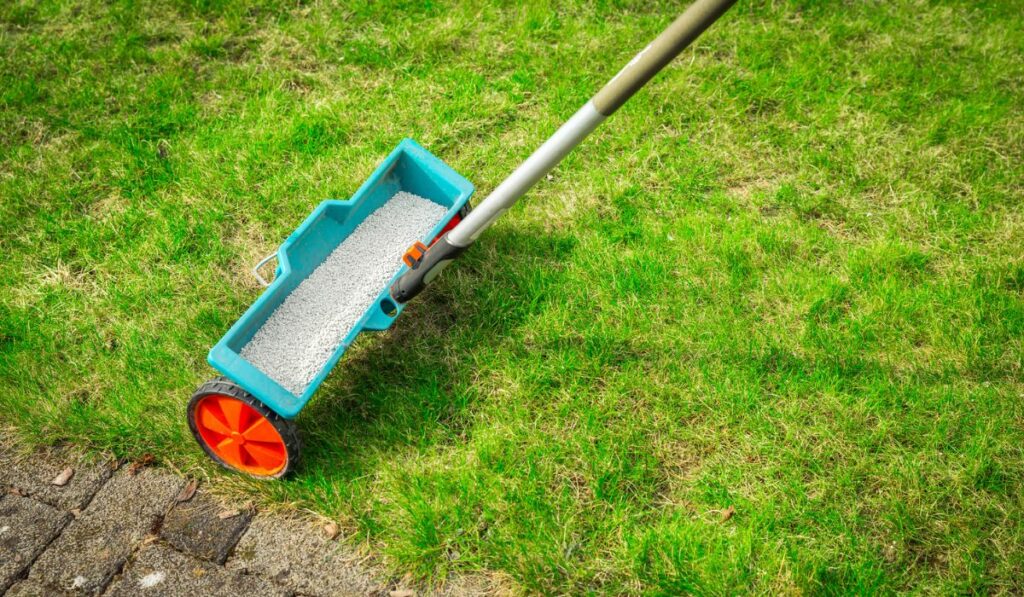
Now that you know when to water your lawn after fertilizing, here are a few more tips to help you get the best results:
- Don’t randomly fertilize your lawn just because it looks a little yellow. Get a soil test done first to determine which nutrients your lawn lacks. This will save you money and help you target the problem more effectively.
- Don’t overdo it! More fertilizer is not better. In fact, too much fertilizer can actually damage your lawn by burning the roots or causing thatch buildup.
- Choose the right fertilizer for your lawn. If you have cool-season grass like bluegrass or fescue, use a nitrogen-rich fertilizer in the spring and fall. If you have warm-season grass like bermudagrass or zoysia, use a phosphorus-rich fertilizer in the late spring or early summer.
- Slow-release fertilizers (on Amazon) are a great option because they provide a steady stream of nutrients over a longer period. This reduces the risk of fertilizer burn and also means you don’t have to fertilize as often.
- Sometimes, alternative methods like ground aeration or grasscycling (leaving your grass clippings on the lawn after mowing) can help your lawn get the nutrients it needs without resorting to fertilizer.
- Thatch is a layer of dead grass, roots, and other organic matter that can build up on your lawn over time. Too much thatch can prevent fertilizer and water from reaching the roots where they’re needed. If your lawn has more than 1/2 inch of thatch, you may need to de-thatch or power-rake it before applying fertilizer.
- Use appropriate methods to spread fertilizer evenly over your lawn. A broadcast spreader or drop spreader works well for granular fertilizers, while a hose-end sprayer or lawn sprinkler system is best for liquid fertilizers.
- Don’t fertilize if your lawn is too dry and the grass is already stressed. Give it a good watering first, then wait a few days before applying fertilizer.
- Don’t fertilize if there are water puddles on your lawn or before a rainstorm. The fertilizer could wash away, causing runoff and pollution.
- If you live in an urban area, be sure to check your local ordinances before fertilizing. Some cities have laws restricting the use of certain fertilizers during certain times of the year.




